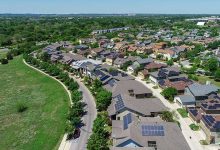The federal government has extended the coverage of the ‘Default Market Offer’ for electricity prices, imposing price controls such as caps, to cover more than a million households with rooftop solar across three states.
Customers in New South Wales, south-east Queensland and South Australia, who are on flexible or time-of-use tariffs and have rooftop solar installed, will now fall under the Default Market Offer regime, which effectively sees a regulated price cap applied to electricity prices as calculated by the Australian Energy Regulator.
The extension of the default offer to solar households will effectively cap the price paid for electricity purchased from the grid, and is not expected to have any impact on the export tariffs paid to households for their excess solar power.
The number of households with solar power while remaining on a standing offer is unknown, but is understood to be a very small portion of the market.
The default market offer was created in an effort to both prevent households becoming stuck on unnecessarily high “standing offers” for electricity tariffs and to provide a consistent reference point for price discounts to remove some of the complexity of comparing electricity price deals between different retailers.
The default offer was introduced last July and was only available to households and small business customers on flat tariffs or had controlled loads, and benefitted those who were unable to shop around for the best deal for their electricity.
Electricity retailers are unable to charge customers more than the default market offer, although the results from AGL suggest that it has meant higher prices for others; the number of people looking for better offers fell rapidly, and AGL’s retail margins actually grew, rather than fell.
The default market pricing regime excluded households with rooftop solar, which are predominantly on flexible or time-of-use tariffs necessary to account for solar generation, from the “price protections” created under the default tariff.
“For customers who find pricing and discounts confusing, or who simply don’t have the time to negotiate a better deal, the Default Market Offer acts as both a strong price safety net and a reference price to help consumers to more easily compare offers and find the cheapest deal,” federal energy minister Angus Taylor said.
“More than one in four Australian families now have solar on their roofs – this is about protecting them from high prices when the sun doesn’t shine.”
The default market offer applies in regions were electricity prices had been effectively unregulated. The ACT and Tasmania continue to set regulated electricity prices and the Victorian State government has introduced its own form of default pricing offer.
With around 90 per cent households and 80 per cent of small businesses on tariffs cheaper than the default offer, with some analysts raising questions over the extent of bill savings actually generated by the default offer. However, the Australian Energy Regulator estimated that those households that were on standing offers experienced an annual electricity cost reduction of $181.
The Department of the Environment and Energy issued a consultation paper in October last year proposing the extension of the default market offer to solar households, with the government currently developing the necessary legislative amendments necessary to implement it.
The Australian Energy Regulator is currently receiving submissions on the draft 2020/21 default market offer determination and expects to release a finalised determination in April.









